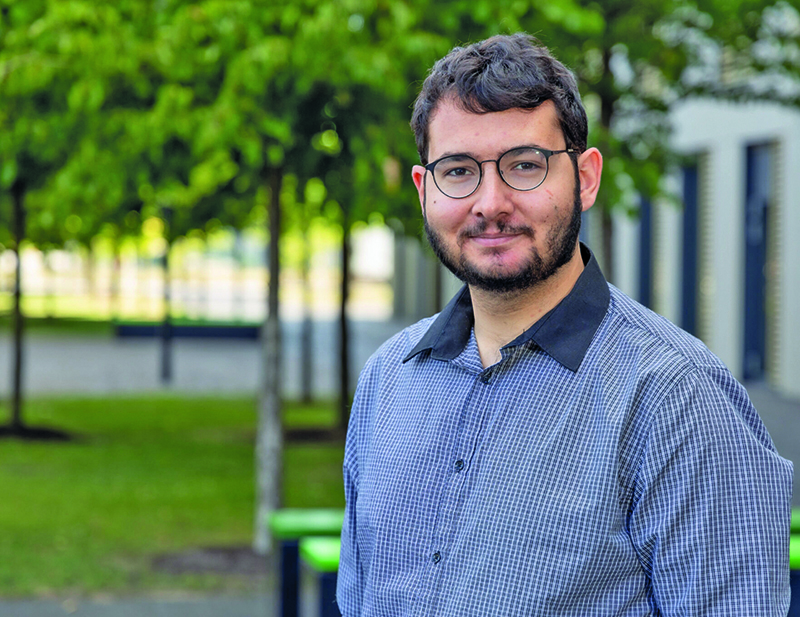Who is this ‘researcher’ that you would like to meet? Is it just the person who led them to their current work, or the part of the person you see when he is doing research? In the first sense, an uncomfortably big part of me is a researcher. In the second, it’s an uncomfortably small one.
Research, as in systemized intellectual curiosity, is something I have done for a long time. When I was 16, I created a constructed language, an artificial system of rules inspired by French, German, and English. It was called Agarin, and I even tried writing poetry in it: cor meo, sapes-de o’mor se ò? (My heart, do you know what love is?) Yes, yes, everyone – even researchers – used to be lovelorn teenagers. Some of us grow to be lovelorn adults, as well.

Apart from lovelorn, this ‘researcher’ was once a young person who wanted to leave home. That’s why he went to Luxembourg in 2017 without knowing anything about it. On paper, the Grand Duchy should be the most exciting place for someone who created a language mixture of Germanic and Romance. Conversely, you might think that English Studies are relatively unpopular in Luxembourg.
The English Studies specialization is, in fact, one of the most popular options for Bachelor students at the University of Luxembourg. Some of it has to do with the subject itself, but a lot of it has to do with the quality of teaching and opportunities presented to students. Studying English in a multilingual, continental setting can be surprisingly illuminating. After all, there are many more speakers of English as a foreign language than native ones. Engaging in anglophone research from ‘the outside’ is much more common on a global scale.
Several global world powers communicate and propagate their agendas in the English language, and many more use English as a lingua franca. As francophone scholarship will begrudgingly admit, the English-speaking sphere of influence has overtaken the status quo.
I do not wish to glorify the ‘researcher’ more than He or She already does – except here, where I choose to capitalize His or Her pronouns. I do not wish to imply that research in English Studies is instrumental in guiding the world into the future; but it is imperative to develop and renew our understanding with the English-speaking world as it interacts with other linguistic cultures. This is because English is the language we have adopted for mediating and translating linguistic cultures.
I choose to be cautiously optimistic when I say English today can bridge divisions within Europe.
Let’s cut to the chase. What is a PhD in English Literature at the University of Luxembourg like? Research in the Humanities has taken a digital turn in the last few decades, so there’s more computer work than you would think. Literary scholars from just three decades ago hardly worried about how to digitally store, organize, and visualize their data. And yet they paved the way for the kind of research we can conduct today.
Let me not embellish and mince words to the reader. The issue of my research, as complex as it is to me, can be presented in a simple manner. The reader will have heard of the English novelist Charles Dickens. He was also the editor for two major weekly periodicals, one of which was Household Words (1850-1860). For five years, it published a series of travel articles titled The Roving Englishman written by the English diplomat Eustace Murray. They start near France and end somewhere in Wallachia, present day Romania.
These 60 texts span more than 250 pages, and I have read them all; I know their author’s travels better than my own. I know what this English diplomat wrote of Germans and of Englishmen at the time, I know how he viewed the Ottoman Empire and the region we call Eastern Europe. So how, dear reader, can I show all of this to you, in an immediate way? How can the entirety of this text be put into a visual synthesis of Eustace Murray’s travel and writing about the people on the European continent? Will we find cultural and political distrust of Britain’s neighbors in the 1850s, like the one as recently as 2016’s Brexit? Perhaps we can talk about this two years down the line!
I opened this article by saying an uncomfortably big part of me is a researcher – and here we arrive at the reason. My life and work in Luxembourg were made possible thanks to my great love for the English language; and, notably, to Bulgaria joining the European Union in 2007. It would be dishonest to omit these facts when you meet this researcher.
My passion for the English language has only grown through my work. I choose to be cautiously optimistic when I say English today can bridge divisions within Europe. Between the UK and the Continent, within and beyond Luxembourg, between East and West – I have chosen to be optimistic.
And to keep up with my optimism, you can visit flamedarinov.com.
Als partizipative Debattenzeitschrift und Diskussionsplattform, treten wir für den freien Zugang zu unseren Veröffentlichungen ein, sind jedoch als Verein ohne Gewinnzweck (ASBL) auf Unterstützung angewiesen.
Sie können uns auf direktem Wege eine kleine Spende über folgenden Code zukommen lassen, für größere Unterstützung, schauen Sie doch gerne in der passenden Rubrik vorbei. Wir freuen uns über Ihre Spende!
